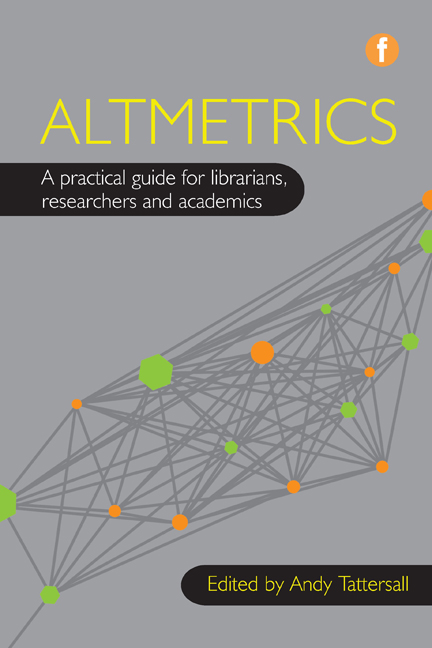Book contents
- Frontmatter
- Contents
- Contributors
- 1 Introduction
- 2 Road map: from Web 2.0 to altmetrics
- 3 ‘Metrics of the trade’: where have we come from?
- 4 The evolution of library metrics
- 5 The rise of altmetrics
- 6 Beyond bibliometrics: altmetrics reflects information about engagement with more types of scholarly content from more types of consumers
- 7 Considerations for implementing new technologies
- 8 Resources and tools
- 9 The connected academic: implementing altmetrics within your organization
- 10 Appmetrics: improving impact on the go
- 11 Open peer review
- 12 Conclusion
- Index
6 - Beyond bibliometrics: altmetrics reflects information about engagement with more types of scholarly content from more types of consumers
Published online by Cambridge University Press: 08 June 2018
- Frontmatter
- Contents
- Contributors
- 1 Introduction
- 2 Road map: from Web 2.0 to altmetrics
- 3 ‘Metrics of the trade’: where have we come from?
- 4 The evolution of library metrics
- 5 The rise of altmetrics
- 6 Beyond bibliometrics: altmetrics reflects information about engagement with more types of scholarly content from more types of consumers
- 7 Considerations for implementing new technologies
- 8 Resources and tools
- 9 The connected academic: implementing altmetrics within your organization
- 10 Appmetrics: improving impact on the go
- 11 Open peer review
- 12 Conclusion
- Index
Summary
Introduction
This chapter will discuss how altmetrics conveys additional information about research impact that isn't captured by traditional metrics. The focus of the chapter will be the hybrid platform Mendeley, which helps researchers to manage references, discover research and form social connections with peers. The chapter will investigate the metrics relevant to this topic and how they can be understood by LIS professionals and academics. The characteristics of these metrics will be explored in detail. The particular focus is on Mendeley readership because that's where my expertise lies, but there are many sources of altmetrics that serve a range of needs.
Mendeley and librarians
Reference management has for a long time been an important application in the LIS professional's toolbox. Used primarily by academics as a way to organize and embed research literature and evidence into their work, it remained mostly undeveloped until the likes of Connotea, Mendeley and CiteULike appeared. Many academic librarians are adept at reference management, which goes hand in hand with literature searching. As part of their role they provide knowledge and expertise to researchers and students on how to use reference management packages. Reference management underpins the systematic and correct approach to research production. Tools have been developed ranging from the established platforms such as EndNote, Reference Manager and RefWorks to a newer, web-based generation of tools such as Mendeley and CiteULike. This second generation of reference management tools takes into account the need for sharing references, accessing them on the web and a social dimension. Tools such as Connotea, CiteULike, Zotero and Mendeley have brought about a shift in reference management. The tool that I will focus on in this chapter is Mendeley, which introduced an alternative metric that allows users to discover papers based on their readership. The purpose of the chapter is to explore some of the functionality and reasons behind some of these new possibilities, using Mendeley's model as a case study. The chapter will look at the different metrics and how they work alongside the other metrics and platforms covered in this book.
- Type
- Chapter
- Information
- AltmetricsA practical guide for librarians, researchers and academics, pp. 83 - 98Publisher: FacetPrint publication year: 2016
- 1
- Cited by



